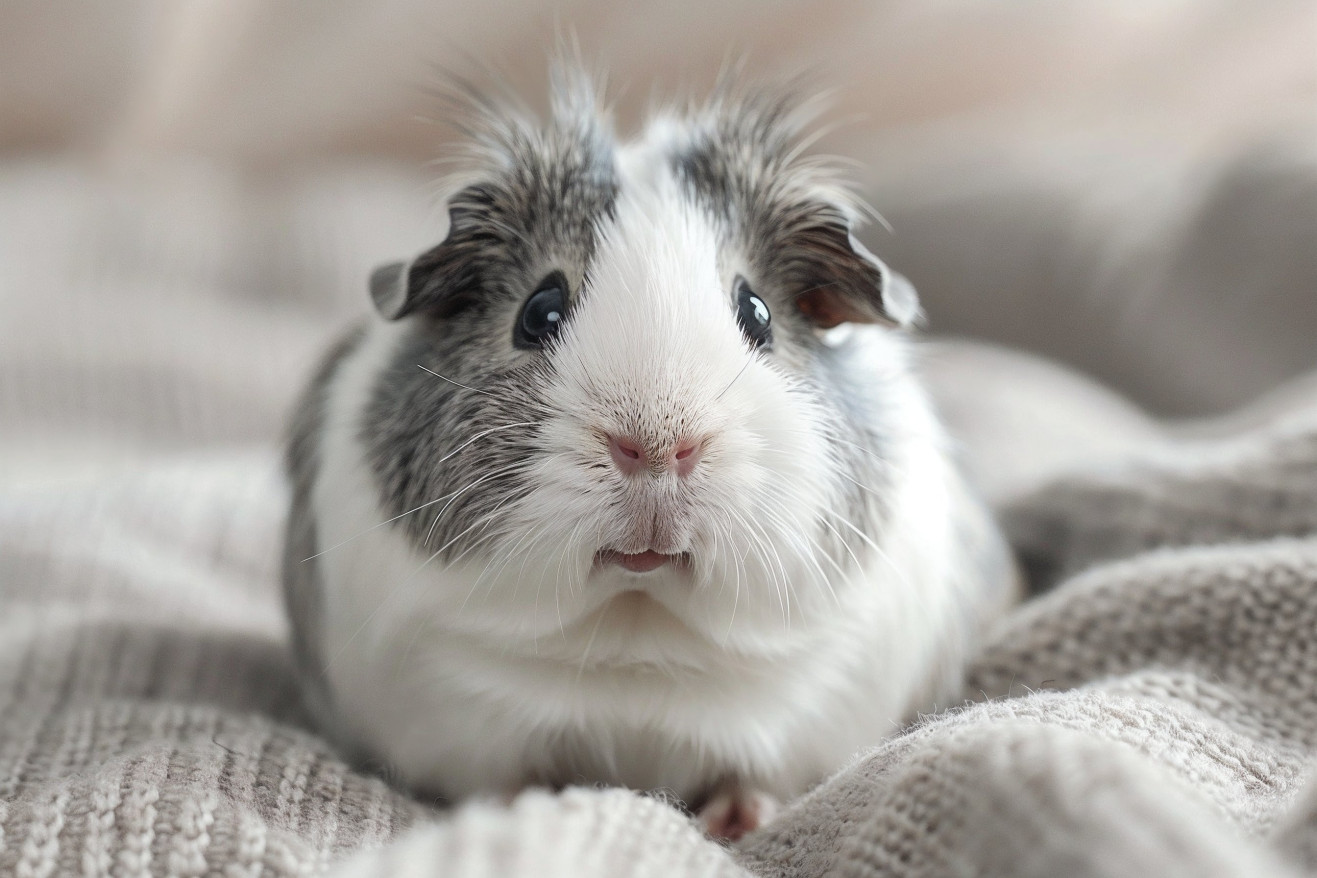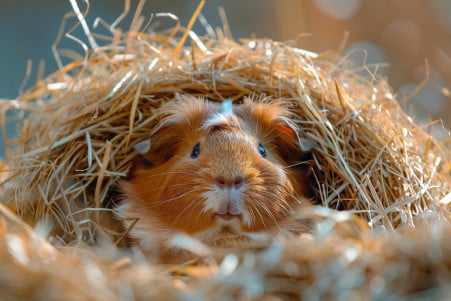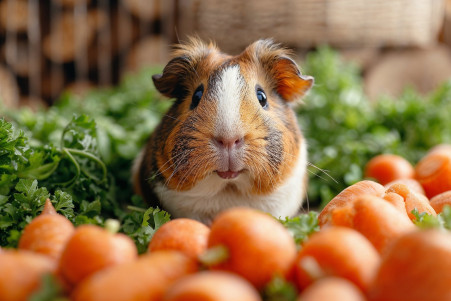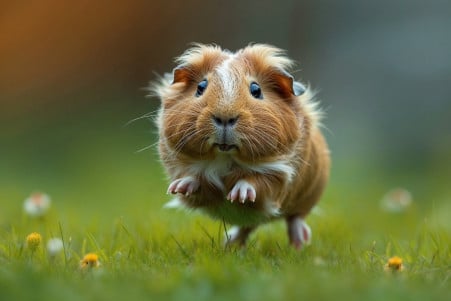What Do Guinea Pig Noises Mean? Breaking Down Their Vocal Language
1 June 2024 • Updated 31 May 2024

From the happy, high-pitched sound of a wheek to the anxious, drawn-out sound of a whistle to the short, sharp sound of a shriek, guinea pigs make a variety of noises to express their feelings, needs, and desires. Guinea pigs use their vocalizations to express their desire for attention, to indicate excitement and anticipation, to express fear or displeasure, and to bond with other guinea pigs.
To better understand the reasons behind the sounds guinea pigs make, this article will delve into the latest scientific research on guinea pig behavior, communication, and the impact of domestication on their vocalizations. By reviewing research from animal behaviorists, zoologists, and guinea pig authorities, this article will explain the situations and reasons that lead guinea pigs to make different sounds. This evidence-based investigation will help you gain a more comprehensive understanding of your furry friend's vocalizations.
What do guinea pig noises mean?
What Different Guinea Pig Sounds Mean
Guinea pigs are highly communicative animals, using approximately 11 different sounds to express their feelings and desires. Some of the most frequently heard sounds are:
Wheeking: A loud, high-pitched sound that guinea pigs make when they are excited or expect something, such as when they are waiting to be fed. It can also be a way of saying hello or asking for attention.
Chutting/Bubbling: A series of quiet, happy "putt-putt" or bubbling sounds that guinea pigs make when they are comfortable and exploring their surroundings or interacting with other guinea pigs.
Rumbling: A low, deep rumble that male guinea pigs use to court female guinea pigs, but can also indicate fear, stress, or a desire to be left alone. This is also known as rumble strutting.
Shrieking: A loud, high-pitched squeal that is a sign of extreme fear, pain, or distress. This sound may indicate that the guinea pig needs immediate help.
Chirping: A soft, occasional chirping sound that is the most mysterious guinea pig noise. It may indicate mild alarm or be associated with a sow nursing her babies. These sounds can be useful for guinea pig parents to understand what their pets are feeling or trying to communicate.
Why Do Guinea Pigs Squeak When You Pick Them Up?
If your guinea pig is making noise when you pick them up, it could be due to feeling scared or stressed, according to Omlet's guide on handling guinea pigs. A small "chirrup" or squeak can mean that the guinea pig is uncomfortable with being picked up, while shrieking or loud squealing typically means that the guinea pig is scared, stressed, or in pain due to being picked up incorrectly, according to Kaytee.
Learning how to pick up a guinea pig properly can help reduce these noises and make the guinea pig feel more secure. Omlet suggests that you can help your guinea pig get used to being handled by using positive reinforcement, which can help lower their stress levels over time. This will help them learn to trust you and feel less threatened by human contact.
Squeaks of Fear: How to Comfort a Scared Guinea Pig
Guinea pigs may scream or squeak in response to fear or perceived threats, according to the Guinea Pig Fearfulness study. Some of the most common things that scare guinea pigs are predators, loud noises, and new people or environments, according to GuineaDad. Other signs of fear in guinea pigs include freezing, lowering the head, shivering, and pacing.
To help guinea pigs that are scared, the Anti-Cruelty Society recommends working to build trust, understanding their body language, and making sure their basic needs are met. In addition, making sure their environment is safe, avoiding things that scare them, and using soothing techniques like petting can help a guinea pig that is scared. With time and patience, pet parents can help their guinea pigs feel more comfortable and secure.
Excessive Squeaking: When Vocalizations Are a Problem
Some guinea pigs may vocalize excessively, constantly squeaking or wheeking, which can be disruptive. According to Newhay, this can be due to personality, attention-seeking, stress, or even medical reasons. Meanwhile, The Guinea Pig Forum points out that excessive squeaking at night can keep owners up and become a problem.
Potential solutions include adding more enrichment to the guinea pig's environment, moving the guinea pig to a larger cage, getting the guinea pig a friend, and taking the guinea pig to the vet, according to GuineaPigCages.com. Meanwhile, Pets on Mom.com explains that dealing with the root cause of stress or anxiety may help reduce these vocalizations. By doing so, the guinea pig may become less vocal.
By learning about the causes of excessive squeaking, guinea pig owners can make changes that help their pet feel more at ease and improve their relationship with their furry friend.
Paying Attention to Your Guinea Pig: Understanding Sounds and Body Language
In addition to the different types of squeaks, guinea pigs make a number of other sounds to express their feelings. As reported by Small Pet Select, these sounds include purring, whining, and teeth chattering. A low, happy purr can indicate contentment, but a higher-pitched purr can show irritation. Whining or moaning sounds can mean a guinea pig is unhappy, and teeth chattering is an aggressive sound that is often made with teeth showing and means "leave me alone," according to The Spruce Pets.
In addition to sounds, guinea pigs use body language to communicate. According to Healthy-Pet, popcorning (hopping in the air) and nose bumping are signs of excitement and happiness, while raised hackles and teeth baring indicate aggression or fear. As noted by Small Pet Select, a guinea pig that stands on its hind legs can be asking for food or trying to see something. Understanding these sounds and behaviors can help guinea pig owners better meet their pets' needs and understand their feelings.
Conclusion: Strengthening Your Relationship Through Communication
Guinea pigs use a wide range of squeaks and vocalizations to communicate their needs and emotions. Learning to interpret these different sounds is key to being an attentive, responsible owner. Distress vocalizations can be minimized by proper handling, reducing stress, and ensuring that your guinea pig's needs are met.
By paying attention to your guinea pig's vocalizations, you can create an enriched, stress-free environment. With time and effort, you can develop a strong bond with your pet.


